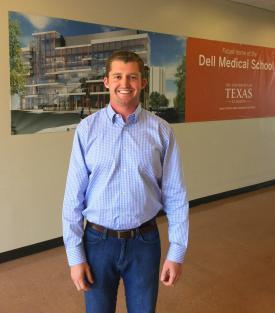Jimmy Fort
Jimmy Fort distinctly remembers the unpleasant ordeal he went through when he broke his arm in the fourth grade. “I felt like there was a rush just to get my bone set in a cast and get me out of the hospital,” he says. “It turned out the bone wasn’t set properly, so there was another procedure and then an extra two weeks in the cast. The impression was “Get this kid on to the next doctor … we’ve got other stuff to do.”

The experience left a lasting impression on Fort, now a junior studying government and business foundations at The University of Texas at Austin. Fort would like to see the landscape of healthcare delivery shift toward a more holistic, compassionate approach that puts patients at the center of care rather than just trying to get them out the door.
“The current incentives and motivations for patient treatment are more focused on the short term rather than the long term. In my eyes, it’s not keeping patients healthy, it’s just fixing the problem at hand and waiting for something else to happen,” he says. “When you consider all the little things, there’s so much opportunity for change. And some of it’s not that complicated, it’s just the norms of health care as we know it today.”
When Fort learned of Dell Medical School’s vision of redesigning medical education to focus more on providing patient-centered care, he and his family became interested in giving to the medical school. Philanthropy has always played an important role in the Fort family, so Jimmy took responsibility for deciding where to designate the gift. After weighing the options, he made a Founders Circle gift to Dell Medical School directed toward establishing a signature course for undergraduate students at The University of Texas at Austin.
All incoming freshmen at UT undertake a signature course during their first couple of semesters of school. The signature courses provide a unique opportunity for students to explore various areas of study and “try on” different majors.
Fort understands the advantage of signature courses, having taken one himself as a freshman. “From my personal experience, [a signature course] helps someone who isn’t sure what they want to do figure that out. It allows you to see some of the different sides of the school and learn information you typically might not get to,” he says.
“Vital Signs: Introducing the Future of Health Care,” Dell Med’s new signature course, will expose undergraduate students to current issues and innovations in health care and showcase how Dell Med is reshaping the future of health care in the greater Austin area. Dell Med hopes this course will inspire a new generation of potential medical students and future physicians who could one day help change the landscape of health care in the community.
Throughout the semester, students will hear from a variety of world-class physicians and healthcare innovators working with Dell Med to create new systems of healthcare delivery. Students will learn about and discuss current issues such as healthcare funding and business practices, emerging medical technologies, healthcare data access and privacy concerns, and healthcare facility and infrastructure redesign. Dr. Mini Kahlon, vice dean for strategy and partnerships, Stacey Chang, the executive director for the Design Institute for Health, and Dr. Patricia Carter from UT Austin’s School of Nursing will spearhead the endeavor as lead faculty for the new course.
Kahlon hopes the signature course will provide a new model of engagement with the healthcare field to undergraduate students who traditionally might not have considered a career in medicine. The course will feature an interdisciplinary approach, incorporating aspects of engineering, business, and fine arts. “Currently, the status quo of medical education at the undergraduate level is to enumerate pre-med requirements for aspiring physicians. Instead, we want to present medicine as a domain of intellectual and scientific engagement with touch points across a variety of disciplines,” she says.
As an active member of the student-based Longhorn Entrepreneurship Agency, Fort considers his gift to Dell Med an entrepreneurial investment in his fellow undergraduates and the future of medicine. “I really thought about it long term. Where’s Dell Medical School going to be 10, 20, 30 years down the road?” he says. “It’s not just a change in healthcare education — it’s a support system for generating these new ideas, products, and practices that are going to revolutionize health care as a whole.”
Fort encourages other young people to start giving back early on in life, too. “It motivates you to be actively involved in the community,” he says. “My parents have stressed that giving back is something you need to do throughout your entire life. I’ve seen that exemplified in my mom and dad, and I was fortunate enough to have them instill that in myself and my siblings as we grew up. [As a result] you keep your eyes open for opportunities to give back.”
“Vital Signs: Introducing the Future of Health Care” will be offered to undergraduate students at UT Austin beginning spring 2017.
Published May 2018